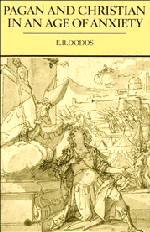 Pagan and Christian in an Age of Anxiety
Pagan and Christian in an Age of Anxiety II - MAN AND THE DAEMONIC WORLD
Published online by Cambridge University Press: 01 June 2011
Summary
We are lived by Powers we pretend to understand.
W. H. AUDENIn chapter 1 I described the progressive devaluation of the cosmos in the early Christian centuries (in other words, the progressive withdrawal of divinity from the material world), and the corresponding devaluation of ordinary human experience. In the next two I shall describe some extra-ordinary experiences of which the record has survived from the second and third centuries. For the present chapter I shall take as my text that passage in the Symposium where Plato defines the daemonic. ‘Everything that is daemonic’, says Diotima to Socrates, ‘is intermediate between God and mortal. Interpreting and conveying the wishes of men to gods and the will of gods to men, it stands between the two and fills the gap. … God has no contact with man; only through the daemonic is there intercourse and conversation between men and gods, whether in the waking state or during sleep. And the man who is expert in such intercourse is a daemonic man, compared with whom the experts in arts or handicrafts are but journeymen.’ This precise definition of the vague terms ‘daemon’ and ‘daemonios’ was something of a novelty in Plato's day, but in the second century after Christ it was the expression of a truism. Virtually every one, pagan, Jewish, Christian or Gnostic, believed in the existence of these beings and in their function as mediators, whether he called them daemons or angels or aions or simply ‘spirits’ (πνεύματα).
- Type
- Chapter
- Information
- Pagan and Christian in an Age of AnxietySome Aspects of Religious Experience from Marcus Aurelius to Constantine, pp. 37 - 68Publisher: Cambridge University PressPrint publication year: 1965


